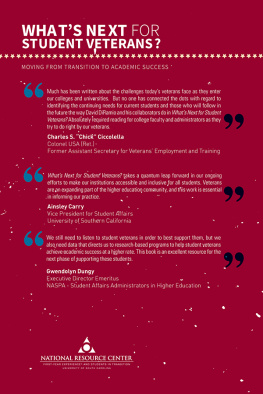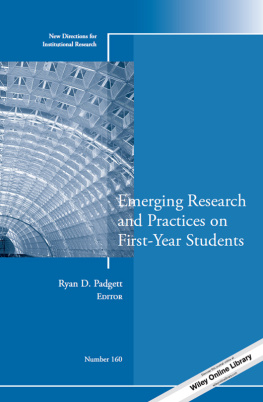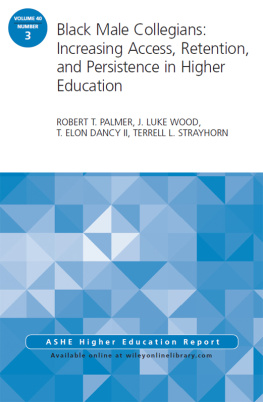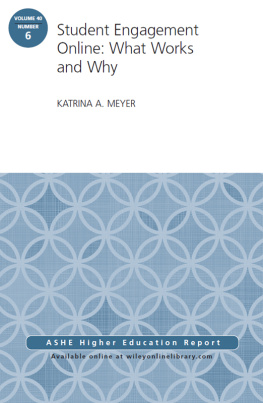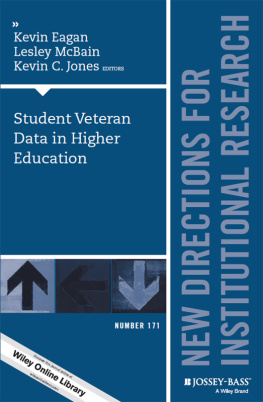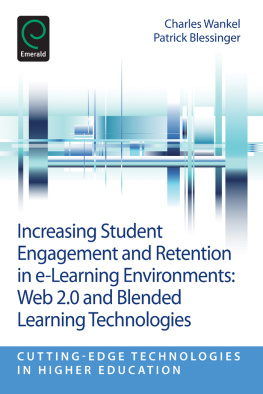Editors
Mahsood Shah , Sally Kift and Liz Thomas
Student Retention and Success in Higher Education
Institutional Change for the 21st Century
1st ed. 2021

Logo of the publisher
Editors
Mahsood Shah
Swinburne University of Technology, Sydney, NSW, Australia
Sally Kift
James Cook University, Townsville, QLD, Australia
Liz Thomas
Edge Hill University, Ormskirk, Lancashire, UK
ISBN 978-3-030-80044-4 e-ISBN 978-3-030-80045-1
https://doi.org/10.1007/978-3-030-80045-1
For more FREE books, go to: textseed.xyz
The Editor(s) (if applicable) and The Author(s), under exclusive license to Springer Nature Switzerland AG 2021
This work is subject to copyright. All rights are solely and exclusively licensed by the Publisher, whether the whole or part of the material is concerned, specifically the rights of translation, reprinting, reuse of illustrations, recitation, broadcasting, reproduction on microfilms or in any other physical way, and transmission or information storage and retrieval, electronic adaptation, computer software, or by similar or dissimilar methodology now known or hereafter developed.
The use of general descriptive names, registered names, trademarks, service marks, etc. in this publication does not imply, even in the absence of a specific statement, that such names are exempt from the relevant protective laws and regulations and therefore free for general use.
The publisher, the authors and the editors are safe to assume that the advice and information in this book are believed to be true and accurate at the date of publication. Neither the publisher nor the authors or the editors give a warranty, expressed or implied, with respect to the material contained herein or for any errors or omissions that may have been made. The publisher remains neutral with regard to jurisdictional claims in published maps and institutional affiliations.
Cover pattern: Alex Linch_shutterstock.com
This Palgrave Macmillan imprint is published by the registered company Springer Nature Switzerland AG
The registered company address is: Gewerbestrasse 11, 6330 Cham, Switzerland
Exploring student success and retention through a cross-section of conceptualisations, definitions, models, approaches, institutions and countries, this book offers a deep and wide range of ideas for consideration. Through the lenses of data, evidence, scholarship, research and reflexivity, the reader is challenged to examine their own and broader assumptions about the complex and challenging areas of University student retention and success.
Marcia Devlin, Former Senior Vice-President and Senior Deputy Vice Chancellor, Victoria University, Australia
Drawing on research evidence and practical examples from Australia, South Africa, Europe and the US this book offers a valuable evidence-led and highly reflexive account of student success and student retention. The book is rooted in the firm belief that institutional change is the key to improving student success, and it provides research informed practical guidance about how to achieve this. The authors encourage us to think deeply and carefully about what we mean by the term student success. This is essential reading for higher education leaders, policy makers, teaching staff, and researchers, as we work together to develop and implement approaches that support student diversity and success.
Susan Orr, Pro Vice Chancellor for Learning and Teaching, York St John University, UK
Preface
Higher education has experienced huge disruption due to the global pandemic. No one predicted the scale at which the pivot to remote learning would impact institutions, staff, students and other stakeholders. The use of digital technology in teaching and assessing student learning is becoming the norm, and institutions are finding innovative ways to provide various academic and non-academic support services online. The pace of change is swift and accompanied by an increased focus on efficiency. Whilst the intent of the changes may have been anticipated in institutional strategy or cyclical review process, the disruption caused by the pandemic has accelerated rapid change at a scale that has not been experienced in the past. Some of the key changes include the restructuring and downsizing of faculties and central support units, building digital capability to teach and support students online, course rationalisation, and reduction of teaching and support staff. These changes are already impacting institutions ability to provide high-quality learning experience to students. In Australia, for example, the most recent Quality Indicators for Learning and Teaching (QILT) data suggest a significant decline in student experience results compared to previous years. While the national data on student retention is not yet available, the disruptions caused will have an undoubted impact on student retention and success, given the pervasive and frequently cumulative impact of the pandemic on the student experienceacademically, personally, logistically, financially, geographically and psychosocially.
Student retention and success have been institutional priorities and the subject of intensive research effort for decades. Many institutions have set targets to improve student retention and success at institutional level and for different profiles of students. The global COVID-19 pandemic is providing new insights into issues that are impacting retention, success and the student experience for all students, as educational disadvantage has both broadened and deepened and structural inequalities have been underscored. Inequities across the student lifecycle, and at all levels of study, have been exposed and exacerbated.
Traditionally and despite the already high volume of online education, institutions have aligned student support resources and facilities to predominately on-campus delivery and left the social experience of learning to face-to-face engagements. The transition to fully online learning has challenged the default delivery mode and is providing new insights on a wide range of critical student experience issues, including support for the mental health and well-being of students and staff; mitigating financial precarity and digital poverty; mediating student engagement in the online study; enabling peer support and social belonging interactions; harnessing data intelligence and policy accommodations for proactive interventions; and assuring the quality of learning, teaching, assessment and support using digital technology for student success. The quality and efficacy of needed-now 24/7 student services and support has been a particular challenge. While some institutions had mature support systems in place, the pandemic has forced all providers to deeply examine the extent to which such support systems are fit for purpose for a fully online or blended mode of learning.
In 2021, efforts to improve student retention and success are more important than ever as nations turn to education and training to rebuild from the current global health, economic, social and educational crises. Failure to re-imagine learning, teaching, assessment and support methods for a better post-pandemic normal would be a gross breach of higher educations social compact with society and a failure to deliver on the common good of public education. Poor student performance will also increase the cost of debt for many students and their families and communities, both for those who rely on government loans to access domestic higher education and for those who make sacrifices to provide international education opportunities for their loved ones. As many contributions to this collection exhort, working in whole-of-institution partnerships with our students for better post-pandemic engagement and experience will be crucial as we reflect on and learn the lessons of these most stressful tests.


